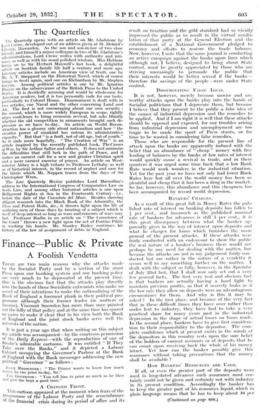The Quarterlies The Quarterly opens with an article on Mr.
Gladstone by Lord Crewe, developed out of an address given at St. Deiniol's Library, Hawarden. As the son and son-in-law of two close friends, and himself a minor colleague in two of Mr. Gladstone's administrations, Lord Crewe writes with authority and inti- macy as well as with his usual polished wisdom. Miss Haldane hangs on to Sir Herbert Maxwell's last book, a delightful article on Scottish family life half a century and more ago. Literary articles include an American view of Scott, one by Mr. A. T. Sheppard on the Historical Novel, which of course brings in Scott again, and one on Richardson by Mr. Stephen Gwynn. Among political articles is one by Mr. Ignatius Phayre on the subservience of the British Press to the. United States. It is decidedly amusing and would be wholesome for American readers, but it is too personally rude for our taste, particularly to Colonel House. Disarmament is dealt with in two articles, one Naval and the other concerning Land and Air. The first is not encouraging about our own security ; the second, which is more widely European in scope, rightly urges confidence to bring economic revival, but asks bluntly whether the old competition in armaments brought such de- pression as we have to-day. An article on World Recon- struction has a gloomy side about nationalism and how "'the creative power of mankind has outrun its administrative capacity." But that " is a fault, not of old age, but of youth." So it ends more hopefully. " The Creation of War ' is an article inspired by the recently published book, The Causes of War, by Sir Arthur Salter and others. It does not minimize the difficulties that still lurk in the path of Peace, and it makes an earnest call for a new and greater Christian spirit and a more earnest exercise of prayer. An article on West- minster Abbey is a high tribute to Professor Lethaby as well as of historical interest, in-the record of neglect and care for the fabric which Mr. Noppen traces from the days of Sir Christopher Wren.
The Law Quarterly Review publishes Lord Macmillan's address to the International Congress of Comparative Law on Scots Law, and among other historical articles is one upon Belligerent Rights at Sea in the Fourteenth Century—i.e., before the date of the Consolato del Mare. Besides showing diligent research into the Black Book of the Admiralty, the Close and Patent Rolls, &c., it throws light upon the life of seafaring men of those days by treating of a subject which is itself of deep interest so long as wars and rumours of wars may last. Professor Radin in an article on The Conscience of the Court" throws a new light upon the act of Pontius Pilate in washing his hands. Mr. Stanley Bailey continues his history -of the law of assignment of debts in England.












































 Previous page
Previous page